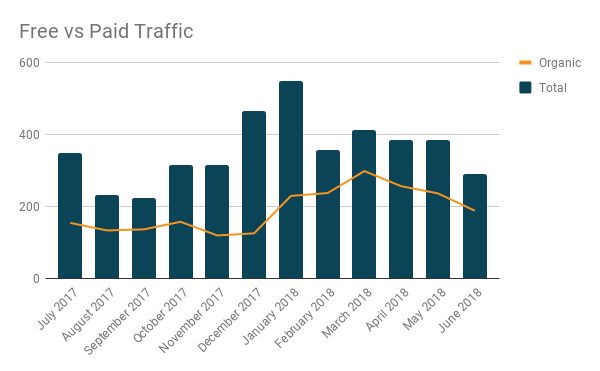Google Ads, formerly Google AdWords, is one of the best opportunities available to apartment marketers looking to generate high-quality, cost-efficient leads online. Time after time we have seen apartment communities use Ads to boost their profile online, generate high-quality traffic to their website, and ultimately to produce new leases for their community.
That said, many in the industry are still convinced that Ads is worthless. "We used Ads once and it just cost us a lot of money without providing any benefit," many will say. This isn't an unusual story, actually. Ads is a complicated tool and figuring out how to use it is difficult.
That said, Google made $95 billion from Ads last year. If Ads was as useless as its critics suggest then it is odd that advertisers would spend so much money on it. That suggests that is some value to be found in Ads for people who know how to use it effectively.
Of course, our own data backs this story up as well. In one recent situation, we successfully used Ads with a client community to, essentially, manufacture demand during a slow leasing season in response to a spike in unexpected notices from residents. The result is that the community jumped from 92% occupancy to 99% in five months and not only recovered from their occupancy dip, but was actually posting record revenues within six months.
The chart below shows how we were able to manufacture demand with Ads. The orange line shows normal demand at that community, based on organic search traffic to the property. The blue bars show the actual demand in a given month, indicated by total traffic, which is mostly boosted by Google Ads.

Basically what Ads allows you to do is to control demand for your property. If normal demand, generated for free via organic search, is sufficient, then you don't need to spend anything. If you need extra demand because your supply exceeds normal demand, then you can create it via Google Ads. By controlling demand, you are taking a step toward controlling vacancy, which is the key to thriving communities and soaring revenue.
Toward that end, here are three key tips to help you win on Google Ads.
Set up defensive campaigns targeting branded keywords.
The first thing you need to do is set up campaigns that defend your branded keywords—keywords that include your community's name in them. If you are Sunny Ridge Apartments in Orlando FL, you want to set up ads targeting keywords like "sunny ridge apartments," or "sunny ridge apartments in orlando fl."
You want to defend these keywords for three reasons:
- First, you can improve the overall clickthrough rate to your site if you have high-ranking organic and paid search results on the search engine result page.
- Second, people who search for your community website by name are going to be your highest quality leads--they know enough about your community to Google you by name. So you want to make sure that when they search for you, they find you.
- Third, Google will show ads on a lot of branded search terms even if the brand itself isn't advertising for it. So if your ad is not showing up on those terms, it's likely that an ILS ad is.
The other benefit to these defensive campaigns is that these ads are going to be more relevant to people searching for you by name, meaning it will be easier to obtain a higher quality score and cheaper clicks on your ads.
Target keywords that reflect intention to lease.
Not all keywords are created equal. Some keywords you might target may sound smart to go after at first, but could actually be less valuable. For instance, if someone searches "(community name) password" that doesn't indicate buying intent; it indicates that the person needs the wifi password. Likely as not, this person is trying to leech wifi or is visiting a friend and needs the wifi password. So you wouldn't want to advertise on this keyword.
In contrast, if someone searches for "(community name) pet policy" that would suggest they are a more engaged lead. They know about you, they like what they see, and they're now checking the pet policy to find out if your pet policy is a fit for them. Someone who searches a keyword like that, in other words, is almost certainly looking to lease an apartment in the very near future.
So when you target keywords, think through the probable intention behind the search. Is the person simply looking for general information? Are they looking for some specific piece of information? Is this something they would search for if they are ready to lease? You need to have firm answers to those questions when determining a keyword strategy.
Use location-specific keywords.
When we say "location-specific" we don't just mean your city or state, we mean more specific locations that will narrow the search. So "apartments in washington dc" is going to be an impossible term to rank for. In contrast, "apartments near georgetown university" can be much more useful as you can find students, new faculty members, and other university staff who need an apartment near campus.
You could also go after "two bedroom apartments near georgetown university" or "pet-friendly apartments near georgetown university." The idea is to pair those apartments targeting specific locations with the other keyword strategies you're using. By doing this, you can narrow the focus of your paid search advertising, thereby targeting more qualified leads and reducing the possibility that your ad would be shown to the wrong people. This will also have the effect of pushing your clikthrough rate up which will typically lead to higher quality scores for your ads which means lower cost-per-click.
Conclusion
Ads is certainly a tricky and often difficult tool to use effectively. That said, the precision with which you can target certain leads is without parallel in online marketing. Additionally, it's actually not that expensive provided you know how to target your campaigns to the right groups.
Overall, then, it's almost always going to be worth the time it takes to learn how to manage it or the money it takes to hire an outside expert who knows what they're doing. There simply isn't another online marketing source that combines precision and cost-effectiveness in this way.

